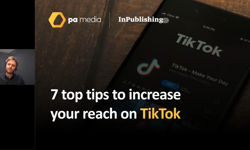
Will Page was formerly chief economist at Spotify, and has just written a book, Tarzan Economics, exploring the lessons from the digital disruption of the music industry.
I interviewed Will on stage at The Publishing Show in September. He shared plenty of insights that are directly relevant to the publishing and media sector.
1. Scarcity of attention and shorter formats
All media are in competition for attention. Famously, Reid Hoffman, CEO of Netflix, said that his main competition is sleep. Songs are getting shorter, few are more than 2 mins 30 seconds. And they get to the chorus quicker. A listen on Spotify is only counted after 30 seconds, so you don’t want to make your listener wait too long.
Publishers creating online content, video, or audio need to hook in the reader or viewer quickly.
2. Direct to customer
For their album ‘In Rainbows’, Radiohead decided to part with their record company and go direct to their fan base. They offered the album as an MP3 download on a “pay what you want” basis. They also released a deluxe CD box at £40, a standard CD and an iTunes album. Overall, they generated more revenue for this album than all their previous albums put together, and they got the cash instantly rather than the usual 12-18 month delay.
This tip-jar model has been proven to generate higher revenues than a standard price. Bandcamp suggest a guide price of £10 for albums but allow listeners to name their own price. The average price paid is £14, 40% above the guide price.
In the media sector, The Guardian has surprised us all with its donation model. And, maybe, publishers should explore the “name your own price” model more. We are already tilting towards direct subscriptions rather than newsstand sales.
This tip-jar model has been proven to generate higher revenues than a standard price.
3. Multiple formats – thrill of a luxury
Radiohead discovered that the same people who paid £5 for an MP3 download would also pay £40 for a deluxe CD box set. And across the music industry, vinyl is having a renaissance – many music fans spend £25 on a vinyl album that may never get played. Vinyl is now 10% of music industry revenues.
Will calls this “the thrill of a luxury” and there is a definite connection to the publishing world. Already, some publishers are upping production values and cover price and finding it more profitable. Readers see the magazine as a “collectible” item. It is also instructive that your biggest fans might want to buy content in multiple formats.
Your biggest fans might want to buy content in multiple formats.
4. Communities encourage higher prices
Was one of the reasons for the success of the tip-jar model the sense that Radiohead fans were part of a community? Will has spotted that open models like crowdfunding or tip-jars encourage people to pay more. This was the lesson of Tupperware – when groups of consumers bought more product than they might do individually. Fans can also be first to discover and make a star. Billie Eilish was promoted by fans on Soundcloud before being signed by a record label.
The take-away for publishers is to encourage community and a sense of contributing to a much-loved media brand.
5. Drip feeding content
Smart music artists know that their fans are hungry for content. Drake drip feeds his audience with short pieces of as little as 42 seconds. Momentum in release schedules is important in the music industry.
This has direct relevance to publishing. TTG Media used to publish a weekly print title. This has now relaunched as a monthly, but backed up by continuous digital content, and a high-profile social media campaign on behalf of the industry, so their brand is always visible to their audience. Event organisers used to have a peak of activity followed by months of silence. Instead, now they are creating online communities to drip-feed content all year round.
6. Access to archive
Subscription models like Netflix and Spotify provide access to a vast archive of content for less than £10 a month. The music industry knows that any high-profile exposure for an artist results in instant interest in their back catalogue.
Publishers are now realising their archive content is a valuable asset, so long as it is easily accessible online, and they actively promote their evergreen material.
There is much more to unpack in Will’s book – with smart ideas on consumer behaviour, pricing and when beleaguered sectors should collaborate.
We forecast that an extra £1billion of advertiser profit will be realised between 2017 and 2025 if we continue on the same growth trajectory.

You can also hear Will Page being interviewed by James Evelegh on a recent episode of The InPublishing Podcast, which was sponsored by Air Business, a leading supplier of distribution and subscription management services.
This article was first published on the Speciall Media website in September.










